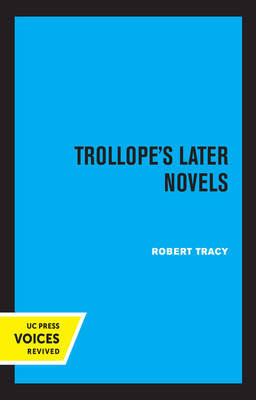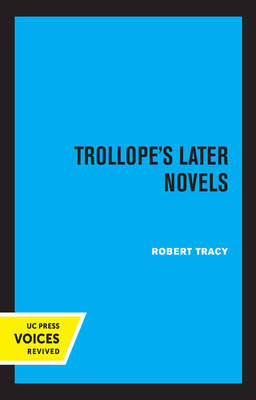
- Afhalen na 1 uur in een winkel met voorraad
- Gratis thuislevering in België vanaf € 30
- Ruim aanbod met 7 miljoen producten
- Afhalen na 1 uur in een winkel met voorraad
- Gratis thuislevering in België vanaf € 30
- Ruim aanbod met 7 miljoen producten
Zoeken
Omschrijving
Trollope's Later Novels by Robert Tracy challenges long-standing assumptions about Anthony Trollope's place in Victorian literature, presenting him not as a genial but second-rate craftsman, but as a novelist of considerable technical sophistication and moral seriousness. Tracy argues that Trollope's later works, especially those of the 1870s, reveal a writer who had reached full artistic maturity. Far from being clumsy or rambling, these novels demonstrate a unity of form and function in which literary style and structure embody a coherent moral theory about society, values, and human conduct. Organized in two parts, the study first situates Trollope's narrative techniques and social vision within the broader debates about form and order, then provides detailed readings of individual works, from Sir Harry Hotspur of Humblethwaite and The Way We Live Now to the late experimental fictions The Fixed Period and Mr. Scarborough's Family. Tracy shows how Trollope's multiple-plot structures, rhetorical choices, and social doctrines interweave to create fiction of remarkable subtlety, even when the author himself dismissed his art as mere craft. By reframing Trollope's achievement, Trollope's Later Novels invites readers and scholars alike to reconsider one of the most prolific Victorian writers as a central figure in the development of the English novel, whose best work exemplifies the unity of art and social vision that Wilde once described as the shared "canons" of both literature and society. This title is part of UC Press's Voices Revived program, which commemorates University of California Press's mission to seek out and cultivate the brightest minds and give them voice, reach, and impact. Drawing on a backlist dating to 1893, Voices Revived makes high-quality, peer-reviewed scholarship accessible once again using print-on-demand technology. This title was originally published in 1978.
Specificaties
Betrokkenen
- Auteur(s):
- Uitgeverij:
Inhoud
- Aantal bladzijden:
- 362
- Taal:
- Engels
Eigenschappen
- Productcode (EAN):
- 9780520316409
- Verschijningsdatum:
- 8/01/2021
- Uitvoering:
- Paperback
- Formaat:
- Trade paperback (VS)
- Afmetingen:
- 148 mm x 210 mm
- Gewicht:
- 390 g

Alleen bij Standaard Boekhandel
+ 169 punten op je klantenkaart van Standaard Boekhandel
Beoordelingen
We publiceren alleen reviews die voldoen aan de voorwaarden voor reviews. Bekijk onze voorwaarden voor reviews.







